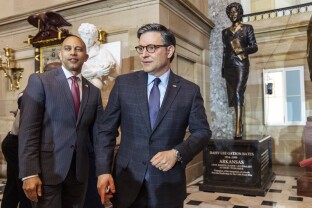The House Democratic Caucus can’t settle on the best strategy to oppose President Donald Trump’s agenda, including whether government spending is the right place to take a stand.
Democrats are under intense pressure from their base to do something to stop Trump, but they’ve struggled to coalesce around what that resistance should look like. That rift broke into the open again on Thursday when some Democrats joined Republicans to vote to censure Rep. Al Green for interrupting Trump’s address to Congress.
With government funding set to expire next week, Democrats are divided on whether they should help Republicans avoid a shutdown.
Senate Democrats have largely unified behind a short-term continuing resolution. Some House Democrats agree. Other Democrats are hesitant to work with a Republican Party and president they believe are untrustworthy.
“There’s not any guarantee that they’re not going to just keep doing what they’re doing and that that whole [negotiation] process will be meaningless,” Rep. Mark Pocan told NOTUS. “We don’t have any assurances.”
Congressional negotiators have not yet come to a deal on government funding, and a continuing resolution is expected.
At the start of this week, Democrats’ strategy was to wholly oppose the GOP’s plan for a continuing resolution that lasts until the end of the current fiscal year. Minority Leader Hakeem Jeffries also said in a press conference Thursday that Democrats would oppose the GOP’s proposed year-long continuing resolution.
Democrats said they don’t want the government to shut down, which would leave swaths of federal workforce without pay for long periods and potentially lead to political consequences.
But they also don’t want to negotiate with Republicans if Trump won’t disburse congressionally approved funds. If Republicans can’t guarantee that Trump will respect Congress’ bipartisan post-funding negotiations, some Democrats said they are willing to sit the process out.
“You can’t work with somebody who doesn’t want to work with you,” Rep. Maxine Waters said of Republicans.
Rep. Danny Davis threw subtle jabs at his Democratic colleagues who are open to negotiating with Republicans under the current climate.
“Well, I’m a different kind of Democrat,” he told NOTUS. “I serve a district with a large population of low- and moderate-income people. Many of the people in my district migrated from the rural South, and of course, they have all of the challenges that individuals and their families who come directly from slavery have that we have not overcome. And so my district has a great deal of need for things like Medicaid.”
But some Democrats believe funding the government is a matter of principle and that they should in no way steer Congress towards a shutdown. Rep. Hank Johnson emphasized that “regardless of what the Trump administration has done, Democrats and Republicans in Congress have a responsibility to fund the government and keep the government open.”
“Democrats are not sitting back deciding that we’re not going to work with Republicans,” he said. “No, we’re ready to work with Republicans. They don’t want to work with us.”
Others are open to negotiating with Republicans to avert a shutdown, as long as Democratic priorities — like SNAP benefits and Medicaid, for example — are kept intact.
“There’s a high level of apprehension in the caucus,” Rep. Emanuel Cleaver told NOTUS. “We can’t trust Republicans. So it depends on how good the deal is. [Especially] if we can get something going where it hits what we’re concerned about.”
Things look different in the Senate, where Democrats have signaled they’d be more in favor of a short-term, clean continuing resolution.
The House is set to vote on the measure next week, with text of the stopgap measure coming this weekend. This adds pressure to vulnerable House Democrats in swing districts who would need to explain to their constituents back home the caucus’ current position and Democrats’ plan to avert a shutdown.
Nevertheless, Democrats are determined not to miss an opportunity to blame Republicans for the dysfunction rampant in Congress.
“They run the floor, not us,” Rep. Jim Clyburn, told NOTUS.
—
Tinashe Chingarande is a NOTUS reporter and an Allbritton Journalism Institute fellow. Daniella Diaz, a reporter at NOTUS, contributed to this report.
Sign in
Log into your free account with your email. Don’t have one?
Check your email for a one-time code.
We sent a 4-digit code to . Enter the pin to confirm your account.
New code will be available in 1:00
Let’s try this again.
We encountered an error with the passcode sent to . Please reenter your email.


